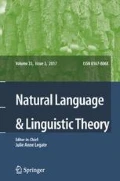Abstract
The Present Perfect in Portuguese has the curious property of forcing iteration of the eventuality described. This paper proposes an account of the iterativity in terms of selectional restrictions of the Present Tense and independent properties of the Perfect and argues against the account of Giorgi and Pianesi (1997) in which the Portuguese Present Perfect is treated as a complex of two main verbs.
Similar content being viewed by others
REFERENCES
Abusch, Dorit and Mats Rooth. 1990. 'Temporal Adverbs and the English Perfect', in Juli Carter, Rose-Marie Déchaine, Bill Philip, and Tim Sherer (eds.), Proceedings of NELS 20, pp. 1–16.
Alonso, Martin. 1968. Gramatica del Españ ol Contemporaneo, Ediciones Guadarrama, Madrid.
Anagnostopoulou, Elena, Sabine Iatridou, and Roumyana Izvorski. 1997. 'On the Morpho-Syntax of the Perfect and How it Relates to its Meaning', manuscript, MIT, Cambridge, MA.
Belletti, Adriana. 1990. Generalized Verb Movement, Rosenberg & Sellier, Torino.
Berwick, Robert. 1985. The Acquisition of Syntactic Knowledge. MIT Press, Cambridge, MA.
Binnick, Robert I. 1991. Time and the Verb: A Guide to Tense and Aspect, Oxford University Press, New York.
Carlson, Greg. 1977. Reference to Kinds in English, unpublished Ph.D. dissertation, University of Massachusetts, Amherst.
Comrie, Bernard. 1976. Aspect, Cambridge University Press, Cambridge.
Demirdache, Hamida and Myriam Uribe-Etxebarria. 1997. 'The Syntactic Primitives of Temporal Relations', Talk presented at Langues et Grammaire III, Paris 1997.
Dowty, David. 1979. Word Meaning and Montague Grammar, Reidel, Dordrecht.
Giorgi, Alessandra and Fabio Pianesi. 1997. Tense and Aspect: from Semantics to Morphosyntax, Oxford University Press, New York.
Gonç alves, Anabela. 1995. 'Aspectos da Sintaxe dos Verbos Auxiliares do Portuguê s Europeu', in Anabela Gonç alves, Madalena Colaç o, Matilde Miguel, and Telmo Mó ia (eds.), Quatro Estudos em Sintaxe do Portuguê s Europeu, Lisboa, Ediç Õ es Colibri, pp. 7–50.
Green, John N. 1987. 'The Evolution of Romance Auxiliaries: Criteria and Chronology', in Martin Harris and Paolo Ramat (eds.), Historical Development of Auxiliaries (Trends in Linguistics, Studies and Monographs, Vol. 35), Berlin, pp. 257–267.
Harre, Catherine E. 1991. Tener + Past Participle, a Case Study in Linguistic Description, Routledge, London.
Hornstein, Norbert. 1990. As Time Goes By: Tense and Universal Grammar, MIT Press, Cambridge, MA.
Jackendoff, Ray. 1997. The Architecture of the Language Faculty, MIT Press, Cambridge, MA.
Kamp, Hans and Uwe Reyle. 1993. From Discourse to Logic, Part 2, Kluwer, Dordrecht.
Klein, Wolfgang. 1997. 'An Analysis of German Perfekt', unpublished manuscript, Max-Planck Institute for Psycholinguistics, Nijmegen.
Krifka, Manfred. 1989. 'Nominal Reference, Temporal Constitution and Quantification in Event Semantics', in Renate Bartsch, Johan van Benthem, and Peter van Ernde Boas (eds.), Semantics and Contextual Expression, Foris, Dordrecht, pp. 75–115.
Michaelis, Laura A. 1998. Aspectual Grammar and Past-Time Reference, Routledge, London.
Mittwoch, Anita. 1988. 'Aspects of English Aspect: On the Interaction of Perfect, Progressive and Durational Phrases', Linguistics and Philosophy 11, 203–254.
Mittwoch, Anita. 1991. 'In Defense of Vendler's Achievements', Belgian Journal of Linguistics 6, 71–85.
Mittwoch, Anita. 1995. 'The English Perfect, Past Perfect and Future Perfect in a Neo-Reichenbachian Framework', in Marco Bertinetto, Valentina Bianchi, Östen Dahl, and Mario Squartini (eds.), Temporal Reference: Aspect and Actionality, Rosenberg and Sellier, Turin, pp. 255–267.
Mó ia, Telmo. 1999. Identifying and Computing Temporal Locating Adverbials with a Particular Focus on Portuguese and English, unpublished Ph.D. dissertation, University of Lisbon.
Musan, Renate. 1998. 'The Core Semantics of the Present Perfect', in Artemis Alexiadou, Nanna Fuhrhop, Paul Law, and Ursula Kleinheinz (eds.), ZAS Papers in Linguistics, Vol. 10, pp. 113–145.
Naumann, Ralph. 1998. 'A Dynamic Logic of Events and States for the Interaction Between Plural Quantification and Verb Aspect in Natural Language', unpublished manuscript, University of Düsseldorf.
Naumann, Ralph. 1999. 'A Dynamic Approach to the Present Perfect in English', unpublished manuscript, University of Düsseldorf.
Oliveira, Fátima and Ana Lopes. 1995. 'Tense and Aspect in Portuguese', in Rolf Thieroff (ed.), Tense Systems in European Languages, Max Niemeyer, Tübingen, pp. 95–110.
Salvi, Giampaolo. 1987. 'Syntactic Restructuring in the Evolution of Romance Auxiliaries', in Martin Harris and Paolo Ramat (eds.), Historical Development of Auxiliaries (Trends in Linguistics, Studies and Monographs, Vol. 35), Berlin, pp. 225–236.
Schmitt, Cristina. 1996. Aspect and the Syntax of Noun Phrases, unpublished Ph.D. dissertation, University of Maryland, College Park.
Schmitt, Cristina. 1998. 'Lack of Iteration: Accusative Clitic Doubling, Participial Absolutes and Have + Agreeing Participles', Probus 10, 243–300.
Stechow, Armin von: 1999, 'Eine Erweiterte Extended Now-Theorie für Perfekt und Futur', unpublished manuscript, University of Tübingen.
Stowell, Timothy. 1993. 'The Syntax of Tense', unpublished manuscript, UCLA.
de Swart, HenriË tte. 1998. 'Aspect Shift and Coercion', Natural Language and Linguistic Theory 16, 347–385.
de Swart, HenriË tte and Arie Molendijk. 1998. 'Negation and the Temporal Structure of Narrative Discourse', unpublished manuscript, Utrecht University.
Verkuyl, Henk J. 1972. On the Compositional Nature of the Aspects, Reidel, Dordrecht.
Verkuyl, Henk J. 1993. A Theory of Aspectuality, Cambridge University Press, Cambridge.
Vincent, Nigel. 1987. 'The Interaction of Periphrasis and Inflection: Some Romance Examples', in Martin Harris and Paolo Ramat (eds.), Historical Development of Auxiliaries (Trends in Linguistics, Studies and Monographs, Vol. 35), Berlin, pp. 237–256.
Wagner, Laura. 1998. The Semantics and Acquisition of Time in Language, unpublished Ph.D. dissertation, University of Pennsylvania.
Wagner, Laura. 1999. 'Acquiring Tense in Form and Meaning', in Annabel Greenhill, Heather Littlefield, and Cheryl Tano (eds.), Proceedings of the 23rd Annual Boston University Conference on Language Development, Vol. 2, Cascadilla Press, Boston, pp. 708–719.
Wunderlich, Dieter. 1997. 'Participle, Perfect and Passive in German', Theorie des Lexicons, Vol. 99, Heinrich Heine Universitaät, Düsseldorf.
Zagona, Karen. 1991. 'Perfective Have and the Theory of Tenses', in Hector Campos and Fernando Martinez-Gil (eds.), Current Studies in Spanish, Georgetown University Press, Washington DC.
Zagona, Karen. 1992. 'Tense-Binding and the Construal of Present Tense', in Christiane Lauefer and Terrell A. Morgan (eds.), Theoretical Analyses in Romance Linguistics, John Benjamins, Amsterdam, pp. 385–398. Received 27 January 2000
Author information
Authors and Affiliations
Rights and permissions
About this article
Cite this article
Schmit, C. Cross-Linguistic Variation And The Present Perfect:The Case Of Portuguese. Natural Language & Linguistic Theory 19, 403–453 (2001). https://doi.org/10.1023/A:1010759911058
Issue Date:
DOI: https://doi.org/10.1023/A:1010759911058




